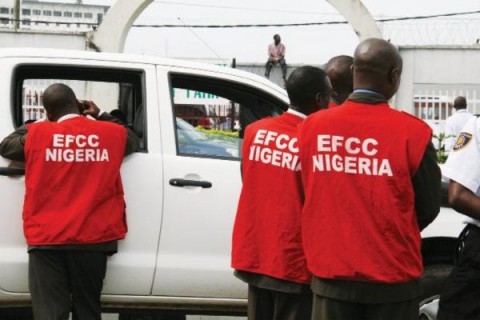Random Thoughts: Fighting Corruption with Corruption
Akintokunbo A Adejumo, Articles/Opinion, Columnists, Latest Headlines Friday, January 15th, 2016
Akintokunbo A Adejumo, akinadejum@aol.com
BALTIMORE, MD (AFRICAN EXAMINER) – I have been musing over the conundrum above for a very long time, even before this new dispensation of the sincere and stern President Buhari, and I can’t get it off my mind, the possibility, that is.
Corruption is defined nowadays simply as “The abuse of entrusted power for private gain”. Please don’t get me wrong, I am not a subscriber to puritanism or absolute inviolability. Corruption is part of humankind and can never be completely eradicated from the face of the earth as longs as human beings inhabit this planet. In individuals, there is always a whiff of one kind of corruption or the other around us. Nobody is truly and totally immune. What I always hope and strive for is reduction of corruption in our society to a manageable level and then a zero-tolerance attitude to it so that it does not rear its hydra-headed ugly aspect again to reduce us to the immobilised state we are right now, and so enable us to develop and progress as a people and as a united nation. We need a holistic and altruistic approach to fighting corruption and reducing it to a manageable level, which will not hinder our development as a people, a nation or a country as it has evidently been doing for the past 5 decades.
Corruption is something you cannot just wake up and eradicate so long as the world still exists. In many countries including the zero-tolerant China, the mighty United States, and most developed Western countries that we see today with bubbling, well-conceived, well-planned, well-implemented and vibrant economies with high standards of living, corruption has not been crushed; it is only being checked and well-managed. We must be reminded that if these countries had not recognised, sorted out and applied effective and efficient corruption management policies and laws, their standards of living and economic powers and vibrancy would have been much devalued.
Nigeria’s new President, Muhammadu Buhari, vowed to fight corruption, but it’s too soon to tell if his efforts will be enough. Some Nigerians, mostly from the opposition camp, even doubt the man’s sincerity. Some also cast aspersion on his government’s sincerity because of the ilk of (allegedly corrupt) party bigwigs and political appointees he has found himself surrounded with and appointed into office, ranging from ministers to backroom staff.
According to Alexis Okeowo, in her article of 14 October 2015, “Can Nigeria’s New Government Overcome Its Old Corruption?”, “Buhari chose party loyalists—like the spokesman of his All
Progressives Congress, Lai Muhammed—as well as politicians such as former Lagos Governor Babatunde Fashola, who has been accused of misusing state funds. (He denies all of the accusations.)……. And Buhari himself was partly elected on the strength of an alliance with veteran kingmaker and southwestern politician Bola Tinubu, who was charged with the illegal operation of sixteen foreign bank accounts while he was the governor of Lagos but never convicted”.
“This is a reminder that, although Nigerians elected Buhari on a platform of change, Buhari’s victory was planned by many people who used to be part of the previous government,” said Max Siollun, a Nigerian military historian and political analyst, and concluded that. “To some extent, the ‘change’ was a rebranding exercise.”
If (theoretically) the majority of the people in government are corrupt, officials will surely be able to keep themselves safe legally. How can a nation or a disciplined and sincere, honest person (e.g. our new elected President) fight it and succeed? Or is it a Sisyphean task – an unceasingly recurring and fruitless labour? Can a country actually save itself without a coup d’état or a bloody revolution? Has this happened before?
I believe corruption is not a problem that can be fought by “a country” or by a government (alone), but rather by “a people”. All that the “country” can do is to provide people with reasonably good and basic standard of living (water, food, electricity and good roads) and good, efficient healthcare, fairness, equality and justice (or a just and fair society where nobody is above the law), decent housing, employment and job creation, even, standardised, universal and free education. That will give everyone a common ground to build upon, and common goals, common worldviews, all that makes people feel that they are all part of the same community. That’s what erases the social borders, pulls down caste systems and brings up “civism” (the feeling that everyone is a citizen from a same “city”, in the Greek sense).
All these might seem insurmountable to achieve, especially now that there is a considerable downturn in the economy of the country; however, based on the profligacy and corruption that had pervaded Nigeria for decades, and the resulting illegal flight of our commonwealth to private, selfish, materialistic pockets and foreign banks, one will see that we have unforgivably erred in this country, as from the day oil was discovered in Nigeria, again, several decades ago, all the above could have been achieved in the first two decades after Independence, and continuing on from Great Britain in 1960, if not for poor, visionless, corrupt, unsympathetic leadership and selfish, ignorant, hypocritical and complacent followers, who believed everything about their own welfare and progress should and could be left in the hands of these politician and military riffraff.
The least corrupt countries are those in which riches is better, evenly distributed and everyone can get a good education and good healthcare if wanted. When education and healthcare become a privilege and the rich are very few while the poor are too many, corruption grows like weed, breaking up social structures as it goes up and spreads around. The same applies to availability and access to good health care, employment, housing and many other social benefits that are expected of a decent society or a responsible and decent government to provide its people.
Corruption can only be fought when everyone is actually equal before the law. When the son of a rich man kills a poor worker while driving at 110 km/h in an inner city road like in Lagos and Abuja and the justice system lets him go, without even the police arresting him, society sees the message: the rich are above the law. When a poor man is held in prison for years without formal accusation, just for being on the wrong place at the wrong time there is another one: you must get rich before you are given any rights. These two messages short-circuit into one: you must get rich as quick as you can, and no matter what. Since most people can’t get rich, they’ll try the next best thing: cut corners at every opportunity, as in precisely what is going on in Nigeria, where the justice system has a notorious abjection for jailing the rich, while it easily puts the ordinary poor citizens behind bars.
It is impossible to fight fire with fire; that’s only a saying. You can’t fight flooding with water and you can’t fight corruption with corruption. Perhaps you can tolerate a little corruption while you fight bigger corruption (I am not convinced though) but you can’t actively use corruption as that.
“Corruption” is not something material that can be isolated and controlled that easily. In that respect, it is harder to control than either fire or water. In theory, large ice blocks could be used to divert a flood or to dam it; it is impractical, but it is at least physically possible (the ice would melt eventually, but you would be able to buy time). In theory, controlled fire could be used to clear a boundary around a larger area that is under firestorm, and then cool the ashes with water and hope that no sparks fly over and spread the fire further. It is however impractical, unsafe and for the most part ineffective, but at least it is a conceivable strategy. But how could you corrupt people and institutions with the intention of fighting corruption? Sounds like spreading diseases with the goal of increasing public health.
I suppose that all countries face this problem eventually. Assuming that the government wants people’s cooperation with the change: Make the new regime fair to ALL people; no scared cows, no vindictiveness or revenge or witch-hunting.
Explain the new regime to ALL the people; educate them, let there be full truthful information dissemination, no propaganda.
Change the rules – change the way things are done, get rid of civil servants and other public officials resistant to change.
Forgive all past sins with the understanding that they are not to be repeated (this is very tough on my sentiments, because I believe, like the Bible says, sinners must not go unpunished)
If taking bribes has traditionally, as it has now become in Nigeria, been a large part of income, expect to increase pay, or introduce generous allowances, to compensate for the loss of bribes and kickbacks. The government should also be prepared to clearly explain the ways in which corruption damages society. People react with less hostility to changes they can plan for and they struggle less against regime change that doesn’t destroy them.
Oh … and the government should put its foot down to crush any resistance immediately. It is far easier to ease up on compliant people than it will ever be to put your foot down a little at a time.
But there are some views that you can fight corruption with corruption, but only as a means to an end. But it won’t work long run. Other people will see the hypocrisy. A responsible and sincere government requires all citizens to be ethical and willing to eliminate, or at least combat and reduce, corruption. It is a sort of consensus morality. It cannot tolerate exceptions.
If you think the income inequality comparisons are toxic, wait until people get a whiff of corruption. The comparisons and envy will be off the scale.
But generally, fighting corruption with corruption doesn’t work. One may temporarily get some good results but it winds up undermining whatever ideals one believes one is fighting for. Then the negative consequences begin to multiply.
In theory, it doesn’t make sense, but there could be a way. If you think that corruption is where you use money to make things happen that shouldn’t, it could be argued that you could carry on accepting corruption payments, but not actually fulfilling your part of the deal. That way you are using corruption against corruption to get the right outcome.
Nigeria is a country where things are only done when people pay an extra cost for things to be done faster. Maybe they want their goods cleared for export or import in less than a few weeks, or maybe they want a planning permission arranged against the local interest. In this corrupt society, people are forced to pay these extra costs, and the cycle carries on. Using corruption to kill corruption, the charges would continue, but the officials would not speed up the process or make decisions against the local interest.
The people who made the payments would get upset, but in time they would learn that there is no advantage to paying a bribe, and the level of service would remain the same. The problem is that you can’t stop corruption from the official side, only from the supply side. If people stop believing that corruption works, they will stop using it as a tool. Education and Re-orientation of our people is needed here, but will take decades. Or maybe not!
Guess it depends on if you believe the end justify the means. But please, dear reader, what do you think – can we use corruption to fight corruption?
Related Posts
Short URL: https://www.africanexaminer.com/?p=29479






















